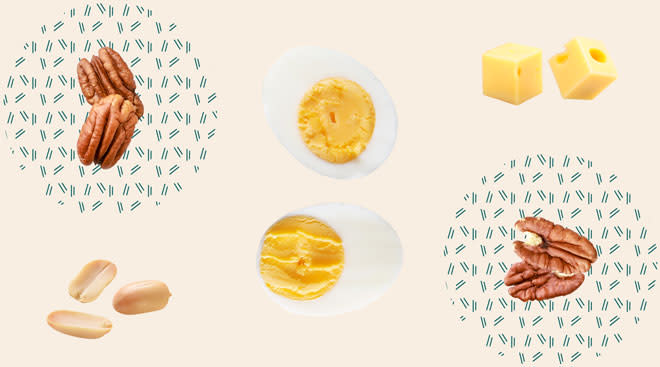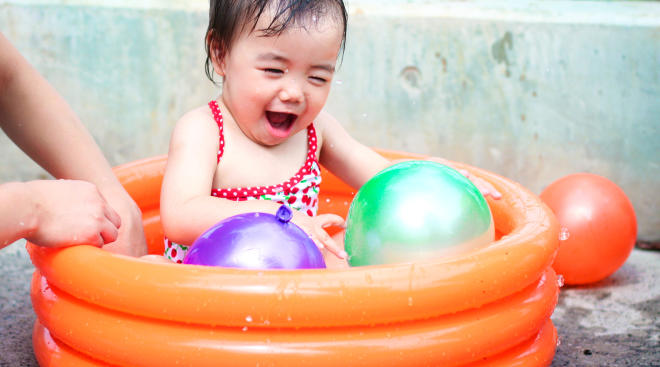7 Ways to Support Your Toddler’s Immune System This Winter
Between a toddler’s developing immune system and their insistence on putting pretty much everything into their mouth, cold and flu season can be incredibly stressful for parents. There’s no realistic way to completely eliminate exposure to viruses, but there are some simple steps you can take to keep your little ones happy and healthy.
Still, it’s important to realize that while you can support your child’s immune system with simple changes and smart lifestyle habits, you can’t proactively improve or enhance it. In fact, stronger isn’t necessarily better when it comes to the immune system. According to Azza Gadir, PhD, a molecular immunologist and scientific advisor for Seed Health, an immune system that is too strong can result in an “over-activated response,” which isn’t a particularly good thing. New York pediatrician Dyan Hes, MD, echoes this: “Our immune system functions in response to infection,” she explains. “We wouldn’t want [an immune system] that is too responsive because this could lead to fevers, aches, pains and inflammation,” she explains.
That said, ensuring your toddler’s immune system is in proper working condition can help reduce the risk of complications from minor colds and other illnesses and give their growing body what it needs to fight off a virus efficiently. Wondering how to go about it? Read on for expert tips.
Giving your toddler a balanced diet is ideal for many reasons, including helping to support their immune system. Of course, as any parent knows, getting a child to eat a balanced diet is sometimes easier in theory than in practice, especially when you’re dealing with a picky eater who refuses to eat anything other than chicken nuggets and applesauce.
Whether your child is a selective eater or not, a simple way to ease them into eating a more balanced diet is by offering fruits and vegetables with their meals. They’re key to a healthy gut (or microbiome), which “plays a critical role in everything from a child’s nutritional responses to their immunity,” says Gadir. In addition to upping the fruits and veggies in your toddler’s diet, Gadir suggests limiting the amount of sugar and processed foods you offer. She explains that an “overload” of these items “can hurt the balance of the gut microbiome, which makes it hard to digest food and for a child’s immune system to function.”
If your toddler is refusing to eat the food you give them and you’re worried about their diet, don’t reach for the supplements just yet; Hes stresses the importance of talking to your child’s pediatrician first. “If a child is deficient in a certain vitamin or mineral, this could weaken their immune function, [but] this would have to be checked by the pediatrician.” So if you suspect your toddler’s unwillingness to try different foods is resulting in a deficiency of some kind, have their doctor run some tests; they’ll work closely with you to supplement your child’s diet appropriately.
It probably doesn’t come as a surprise that in order for the body to perform at its best, it needs to be well rested. Not getting enough sleep affects the body in a number of ways, including the immune system. In fact, a 2009 study found that participants who experienced “poorer sleep efficiency and shorter sleep duration” in the days and weeks leading up to exposure to a common cold virus showed a “lower resistance” to the illness than those who had gotten adequate sleep. While this particular study involved adults, it’s safe to say that kids’ bodies require sufficient down time too.
Toddlers need between 11 and 14 hours of sleep per day (including naps), according to the American Academy of Pediatrics. What’s more, it’s not just about how many hours of shuteye they get—sleep quality matters too. Of course, many toddlers fight bedtime, but the more persistent you are, the better they’ll sleep in general, notes Gadir. She explains that a regular sleep schedule will keep the gut in balance, and a balanced gut can “help your child sleep more soundly.” In other words, sleep begets sleep.
Prebiotics and probiotics are definitely health buzzwords, but what are they and how do they help support a toddler’s immune system? Prebiotics, according to Hes, is “fiber that good gut flora like to eat [and] helps improve the healthy flora in the gastrointestinal system.” Probiotics, on the other hand, “are actually living organisms that can populate in your gastrointestinal system and help recolonize your gut with good flora,” she explains, which is especially helpful when recovering from a stomach bug.
Both prebiotics and probiotics can benefit the body and the immune system in their own way, but they often come in the form of dietary supplements, which shouldn’t be given to a toddler without consulting their pediatrician first. Trying to figure out the right product on your own isn’t a great idea anyway because Gadir says that “not all probiotics are created equal,” so it’s best to just leave the research to your toddler’s doctor.
Toddlers are little balls of energy, and one of the best things you can do is encourage them to run around and get as much of it out of them as possible. At this age, Hes says, “toddlers need a minimum of three hours of play activity per day.” There are a lot of reasons why physical activity is good for kids, and one of them is because it’s a great way to support their immune systems.
Some research has found that people who are physically active tend to fare better when exposed to a virus compared to those who are more sedentary. This isn’t to say that you need to put your toddler on a strict exercise schedule, of course. But the more you can get their little body moving every day, the more support you’re offering their immune system.
If there’s one thing toddlers are definitely not known for, it’s having good hygiene habits. No one loves to put foreign objects into their mouth or sneeze directly into someone’s face more than a young child. This is why you have to keep teaching, reiterating and demonstrating proper hygiene; it will make a big impact on their immune system and overall health.
According to Gadir, having your child regularly brush their teeth can help support their immune system. “The mouth is the second most diverse part of the body (after the gut),” says Gadir, “with over 700 types of bacteria that work to prevent smelly breath, cavities, and make sure nothing harmful finds a place to live.” Like the gut, the healthier the mouth is, the more balanced the microbiome is, which directly impacts the body’s overall health, including the immune system.
The other big thing to focus on teaching your toddler? Proper hand washing. “Little ones are known to put their hands everywhere,” explains Hes, so the more they expose their body to the germs they pick up from all of the surfaces their hands touch, the harder their immune system has to work to fight them off. By making sure they’re regularly washing their hands, you’re helping to minimize that risk. If hand-washing isn’t an option, your next best option is hand sanitizer (with adult supervision).
There’s a good reason your toddler’s doctor and the AAP recommend vaccinations: They help support the immune system. “Young immune systems are naive to infectious microbes, putting children at greater risk of illness,” says Gadir. “Keeping your child up to date on their vaccine schedules is critical to their immune health.”
By giving your child a vaccine, you’re exposing them to a very small amount of “weak or dead germs,” which triggers a response from the immune system, according to the Department of Health and Human Services. The body will then fight off the germ and remember it so that if it invades again, the immune system will know to attack. Not only do vaccines help protect your toddler from illness, serious complications and death caused by certain viruses, but they have also been shown to help the body respond to modified variants of viruses, according to research published in the journal Cell. Basically, vaccines are one of the best tools out there for supporting a toddler’s immune system.
Your toddler’s love of the great outdoors pays off in a lot of ways, including supporting their immune system. According to Gadir, when toddlers are outside they’re being exposed to new, different microbiota that will mix with their own, “helping to build adaptive immunity.” A 2018 study concluded that “exposure to a range of microorganisms” found outdoors “may be important for the development of the immune system and for regulation of inflammatory responses.”
Since cold and flu season peaks during the winter months, parents may be hesitant to take their kids outside, but the falling temperature is no reason to keep them indoors. “Cold weather doesn’t make a child sick,” Hes emphasizes. “This is a myth,” she adds. Assuming it isn’t dangerously cold outside, just make sure to bundle your toddler up so they’re comfortable, then get them out there breathing in that fresh air (and supporting their immune system in the process).
Colds and viruses are a par for the course when you have a toddler. The inevitable sniffle or bug is to be expected—it’s often unavoidable. But making small changes to support their immune system can help ensure that when they are exposed to viral germs, their body will be ready to battle and conquer them quickly and effectively.
Please note: The Bump and the materials and information it contains are not intended to, and do not constitute, medical or other health advice or diagnosis and should not be used as such. You should always consult with a qualified physician or health professional about your specific circumstances.
Plus, more from The Bump:
Azza Gadir, PhD, is a molecular immunologist and scientific advisor for Seed Health. She received her undergraduate degree from London School of Hygiene and Tropical Medicine and her doctoral degree from University College London before completing her postdoctoral training at Harvard Medical School.
Dyan Hes, MD, is a pediatrician and the medical director of Gramercy Pediatrics in New York City. She earned her medical degree from the Sackler School of Medicine at Tel-Aviv University in 1997.
JAMA Internal Medicine, Sleep Habits and Susceptibility to the Common Cold, January 2009
American Academy of Pediatrics, Healthy Sleep Habits: How Many Hours Does Your Child Need?, November 2020
Clinical and Experimental Medicine, Physical exercise as a tool to help the immune system against COVID-19: an integrative review of the current literature, July 2020
American Academy of Pediatrics, All About the Recommended Immunization Schedules, February 2023
US Department of Health and Human Services, Vaccines, May 2022
Elsevier, Why and How Vaccines Work, October 2020
Environmental Research, The health benefits of the great outdoors: A systematic review and meta-analysis of greenspace exposure and health outcomes, October 2018
Learn how we ensure the accuracy of our content through our editorial and medical review process.
Navigate forward to interact with the calendar and select a date. Press the question mark key to get the keyboard shortcuts for changing dates.




















































